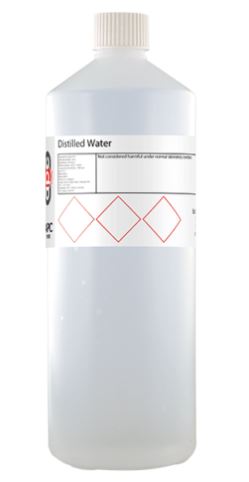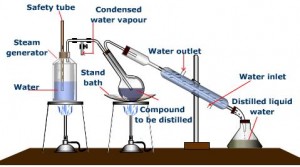WATER, DISTILLED, 1 l, bot.
Valid Article
WATER, DISTILLED
Definition
Water free of minerals and micro-organisms produced by distillation, used to prepare solutions and stains in a laboratory.
Distillation purifies liquid by boiling it, capturing the steam and then condensing the vapors. The condensed vapors are then returned to their liquid state finishing the distillation process. Solids and other contaminants, salt being the most important, remain in the original container with just pure water being reduced to vapor.
Specifications
Technical specifications
- CAS n°: 7732-18-5
- Formula: H2O
- Molecular weight: 18.02 g/mol
- Liquid, colourless
- Quality: distilled
- Pure, constant and does not interfere with any chemical processes
It takes approximately five units of water to create one unit of distilled water.
Packaging & Labelling
1 litre plastic bottle
Transport Dangerous Goods
Transport not regulated
Instructions for use
- Distilled water is used primarily as a solvent for reagent preparation, as a calibration standard or analytical blank, or for cleaning testing equipment and rinsing an analyte.
- Distilled water is necessary for biochemistry.
- For stainings distilled water can be replaced by filtered rainwater (collected in clean receptacles).
When performing analytical work it is recommended to use distilled water.
If you are doing routine chemistry where absolute purity is not important, the cheaper deionized water may be used.
Please consult the “Updated laboratory procedures, 2022” available online via the Laboratory working Group sharepoint page: Laboratory Procedures and Resources.
https://msfintl.sharepoint.com/sites/msfintlcommunities/LabWG/SitePages/Laboratory-Manual-page.aspx
For offline access, contact your laboratory advisor.
Precautions for Use
Distilled water can be substituted for deionized water, but deionized water should never be exchanged when distilled water is required.
Always check with the manufacturer's instructions before speculating about whether distilled water or deionized water should be used.
Storage
If the bottle has not been opened, no expiry date.
Classification EC Regulation N° 1272/2008
Not classified as hazardous




